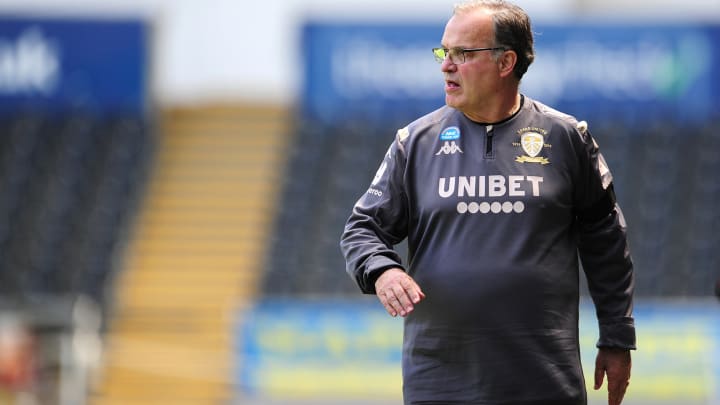No Language Barrier Could Keep Marcelo Bielsa's Magic From Touching Leeds United

As Leeds United continues to celebrate earning automatic promotion to the Premier League and winning England's second-tier Championship, the club, its fans and the city only have one hero in mind to thank: Marcelo Bielsa.
Once Huddersfield defeated West Brom last Friday (which was followed by Brentford’s loss to Stoke the following day to clinch a first-place finish) the celebrations began. Locals gathered outside Bielsa’s house to thank him, fans rallied around Elland Road to kick off the festivities and it was revealed that a street inside the city center has been named after the eccentric Argentine. Video footage from the club also showed the first team, coaches and staff showering their manager with hugs and gratitude during a viewing party inside the stadium. Bielsa is clearly touched, equally emotional while embracing each member of his team.
In the video, not many words are said as the manager’s English (and the squad’s Spanish) is limited, but the admiration and mutual respect is evident for all to see. This was a perfect example of a collective achievement, a total team effort where language limitations were not seen as an obstacle, but rather an opportunity. The 64-year-old manager from Rosario, Argentina–adored by all but truly known by few–came to West Yorkshire in 2018 to help a former giant of English football return to the top flight.
The challenge, however, for both manager and club, was not just the fact that Bielsa knew very little about the Championship or English culture, but also–just like in previous jobs–he would need a translator and other means to communicate with the team. Equally, on the other side, his players would have to find a way to fully accept and follow Bielsa’s philosophies and man-management attributes, especially when language could be an issue. The support needs to be in place to facilitate both ends of the equation. When the appointment was made, it was natural to be hesitant. Recent events, like the communication barrier that impacted Unai Emery at Arsenal or U.S. Soccer's reluctance to approach a manager like Tata Martino due to placing an emphasis on hiring a fluent English speaker, highlight the hurdles that sometimes exist in the global game. But as the relationship between club and manager blossomed, you could see that this would be different, and that the Leeds-Bielsa marriage would be a unique experience.
For one, when they met, both club and manager realized their own similarities: there were ups and downs and inconsistencies in their past, but after everything they have been through, gambling on each other was all they had left. Their relationship started with a desire to bet on the unknown. For Bielsa, motivation is driven by challenge.
“He is a person that likes to focus on goals that aren’t easy to achieve," Ricardo Lunari, a former player under Bielsa at Newell’s Old Boys and someone who considers him a friend and mentor, said during Amazon’s All or Nothing documentary on the club.
"Things that are easy bore him," Lunari continued. "He is interested in difficult challenges, challenges that have a lot to do with the heart, that he can put into them and the people that he works with."
As a result, Bielsa’s initial journey of understanding Leeds United started not with the team’s training facilities or squad depth but rather how the club operates and functions within the city itself–not as a franchise but rather as a servant of the community. How can Leeds United help Leeds, and vice versa. Learning how to speak English had nothing to do with it.
Lunari adds in the documentary, “If Bielsa doesn’t fall in love with a city he will not go. Bielsa did not go to manage Leeds for just the football club, Bielsa went to manage Leeds for the city as a whole.”
And this is an essential factor in regard to the club securing promotion, returning to the Premier League for the first time in 16 years. The manager’s initial steps were learning the city and what it represented. In return, the city and the club welcomed him to do so.
Bielsa’s journey with Leeds, therefore, should be seen as a counter-argument for clubs or federations who see the need to learn a language as a deterrent. When hiring a prospective manager, an organization should look out for characteristics that prioritize the culture of a team, its role inside its community and society and how the squad reacts not just on the pitch, but off it, too. This continuous obsession with self-improvement should be instinctive. And in return, the team should do everything possible to facilitate these values. Just like in life, soccer is about building bridges of trust–the kind of kinship that has been struck at MLS's San Jose Earthquakes, too–and once that has been done, the potential is endless.
Bielsa’s success with Leeds is a testament to that, and should serve as inspiration for others to put it into practice more often.

Luis Miguel Echegaray is a reporter, producer and head of Latino/Spanish content with Sports Illustrated. He is also an adjunct professor at CUNY Graduate School of Journalism.